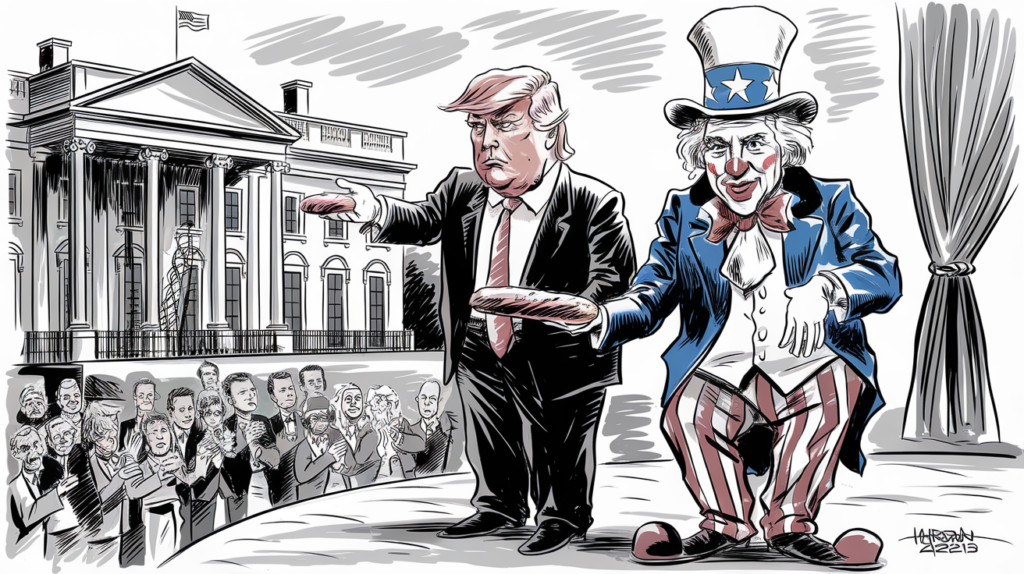
It’s difficult not to think about the United States during these times. One term I’ve increasingly heard mentioned in the same breath as the USA is the rather complex word ”kakistocracy.” This concept, derived from Greek, where ”κάκιστος” (kakistos) means ”worst” and ”κράτος” (kratos) means ”rule,” refers to a system of government where the least qualified and most unscrupulous individuals hold power. The term has been used to describe situations where incompetence, corruption, and self-serving motives permeate political leadership, directly undermining good governance. Understanding this concept is crucial when analyzing America’s political evolution, particularly against the backdrop of changes in recent decades, and even more so in light of recent developments. Kakistocracy appears to be an increasingly relevant concept in the American context due to the growing erosion of democratic norms and institutions, combined with intense polarization and a political culture where special interests and loyalties outweigh competence and responsibility.
With Donald Trump returning as president in 2025, there is a real risk that this deterioration will deepen further. His previous term was characterized by a clear weakening of both domestic and international institutions. This time, the decline is likely to accelerate. Trump’s intentions for his term have been made visible through a plan, often called ”Project 2025,” which aims to radically reshape the American political and administrative system. The plan includes the dismissal of thousands of federal civil servants and their replacement with politically loyal individuals. This would mean that expertise and independence are set aside in favor of centralizing power to the president and his inner circle.
Trust in the U.S. political system has eroded significantly over recent decades. Only a small portion of the population, around 17 percent, believes that federal authorities generally act in the public’s best interest. This skepticism is rooted in a political culture where special interests have gained an increasingly dominant role. Through dark money campaign contributions and other forms of economic influence, these groups have been able to affect decision-making to an extent that directly challenges the foundations of democracy.
However, this development is not limited to the political landscape. Even at the administrative level, deficiencies have become apparent. Appointments to high-ranking positions are often characterized by loyalty to partisan agendas rather than competence and experience. In some cases, individuals have been appointed who not only lack necessary expertise but actively work against their agencies’ missions. This creates a dysfunctional structure where institutions are weakened from within and their ability to serve the public is substantially reduced.
The Senate, which in theory should function as a balancing force within American checks and balances, has in practice become a tool for partisan interests. This has weakened its role as an oversight body and diminished opportunities for independent scrutiny of executive power. Meanwhile, the United States has lost ground in international corruption measurements, now ranking 24th in Transparency International’s global ranking. This development reflects not only increasing clientelism but also a system where power and privileges are largely distributed according to private interests rather than the public good.
The institutional weakening, which appears to be worsening, has serious consequences for America’s role as a global superpower. A United States where the principles of rule of law are undermined and political power is concentrated risks losing its international influence. Traditional alliances, such as those with Europe, Japan, and South Korea, could be further eroded. Trump’s ”America First” policy has already proven destructive to multilateral cooperation and international stability. If this policy intensifies, the global order could be further destabilized at a time when the world confronts significant security challenges, including Russia’s war in Ukraine, China’s growing aggression toward Taiwan, North Korea’s nuclear program, and a increasingly volatile Middle East.
Simultaneously, the U.S. faces new geopolitical alliances between autocratic states such as Russia, China, Iran, and North Korea. This so-called ”axis of autocracies” challenges not only American power but also fundamental values like democracy and human rights. If the U.S. under President Trump chooses to continue its isolationist foreign policy, these authoritarian states risk strengthening their influence on the global stage. This development would further weaken the position of Western liberal democracy and make it more difficult to address global crises such as climate change, pandemics, and economic challenges.
The economic consequences of a kakistocracy in the United States are also significant, both domestically and internationally. Trump’s previous policies were marked by trade conflicts, particularly with China, and there is an imminent risk these conflicts will escalate. For companies dependent on international trade, this can lead to uncertainty and economic losses. Meanwhile, investments in environmental and climate-related projects may be halted, exacerbating global efforts to address the climate crisis.
From a democratic perspective, the U.S. has already been classified as a ”flawed democracy” in several international analyses. Project 2025 appears to signal a further deterioration of the current state, where the democratic process loses its credibility and legitimacy. If election results are not accepted and political institutions are manipulated, the U.S. risks moving toward an authoritarian regime. Stagnation, social unrest, and violence could be additional consequences of such a scenario, which in turn further weakens the country’s internal stability and international credibility.
In a geopolitical perspective, the risks of a United States characterized by kakistocracy are substantial. As the world’s largest economy and a central actor in international politics, the U.S. plays a crucial role in maintaining global stability. If its political system weakens further, this threatens not only domestic democracy but also the global world order. For the world, it means a period of increased uncertainty, where the balance of power risks shifting in favor of authoritarian regimes, with consequences that may be difficult to predict. The question is whether the United States, and the world, can handle the challenges posed by a kakistocratic superpower.
Lämna ett svar